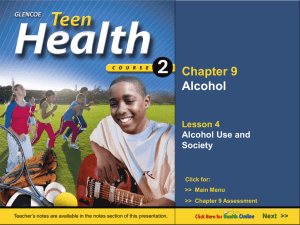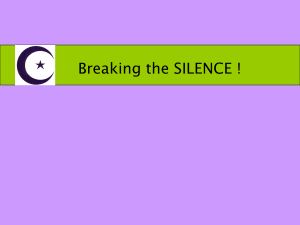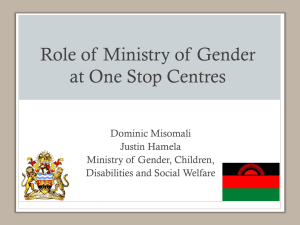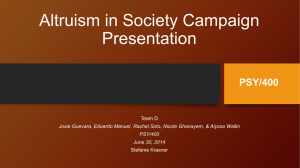Participant Manual - BRANCHpartners.org
advertisement
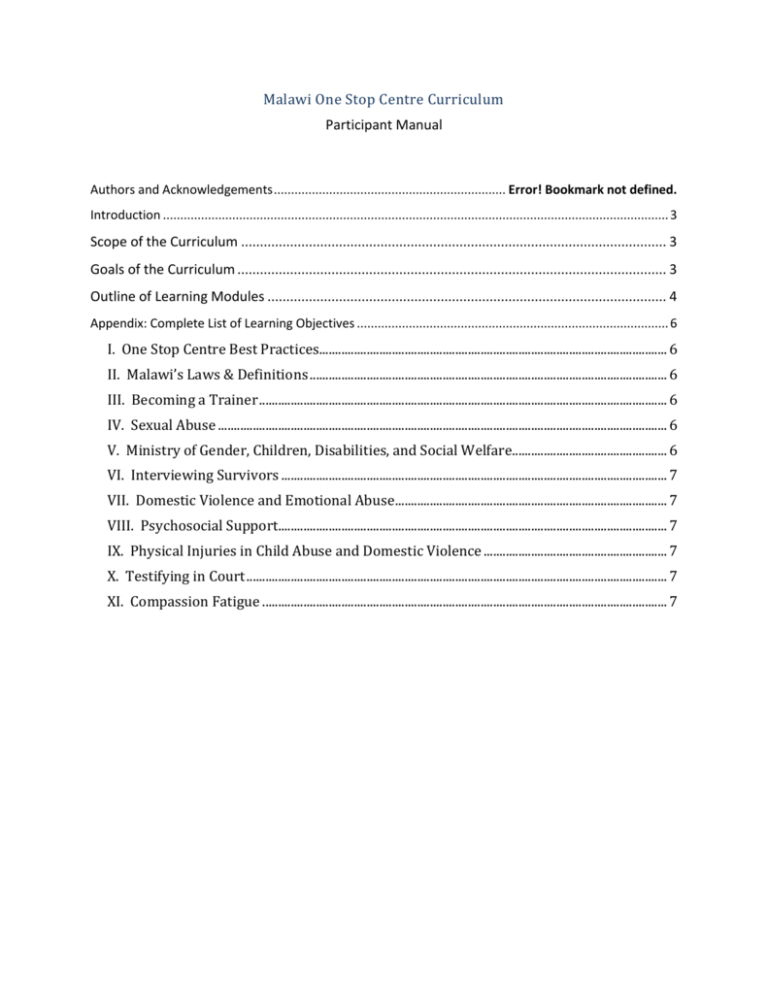
Malawi One Stop Centre Curriculum Participant Manual Authors and Acknowledgements ................................................................... Error! Bookmark not defined. Introduction .................................................................................................................................................. 3 Scope of the Curriculum ................................................................................................................. 3 Goals of the Curriculum .................................................................................................................. 3 Outline of Learning Modules .......................................................................................................... 4 Appendix: Complete List of Learning Objectives .......................................................................................... 6 I. One Stop Centre Best Practices.............................................................................................................. 6 II. Malawi’s Laws & Definitions ................................................................................................................. 6 III. Becoming a Trainer ................................................................................................................................. 6 IV. Sexual Abuse .............................................................................................................................................. 6 V. Ministry of Gender, Children, Disabilities, and Social Welfare................................................. 6 VI. Interviewing Survivors .......................................................................................................................... 7 VII. Domestic Violence and Emotional Abuse ...................................................................................... 7 VIII. Psychosocial Support........................................................................................................................... 7 IX. Physical Injuries in Child Abuse and Domestic Violence .......................................................... 7 X. Testifying in Court ..................................................................................................................................... 7 XI. Compassion Fatigue ................................................................................................................................ 7 Editors and Contributing Authors Co-Editors Aaron J. Miller, MD, MPA, FAAP Executive Director, BRANCH – Building Regional Alliances to Nurture Child Health Neil Kennedy MRCPH, MMedSci, DTMH Head of Department, Pediatrics Malawi College of Medicine Blantyre, Malawi Contributing Authors Stephen C. Boos, MD, FAAP Child Abuse Pediatrics Medical Director, Baystate Family Advocacy Center Associate Professor of Pediatrics Tufts University School of Medicine Springfield, Massachusetts, USA David L. Corwin, MD, FAAP Professor of Pediatrics University of Utah School of Medicine Salt Lake City, Utah, USA Justin Hamela Director of Gender Ministry of Gender, Children, Disabilities & Social Welfare Lilongwe, Malawi Marilyn Kaufhold, MD, FAAP Child Abuse Pediatrics Chadwick Center for Children & Families Rady Children’s Hospital San Diego, California, USA Sandra Murray, MD, FAAP Child Abuse Pediatrics HS Associate Clinical Professor Department of Pediatrics UCI Medical Center Orange, California, USA John Stirling, Jr., MD, FAAP Child Abuse Pediatrics Director, Center for Child Protection, Santa Clara Valley Medical Center Clinical Professor (Affiliated) in Pediatrics, Department of Pediatrics Stanford University School of Medicine San Jose, California, USA Tandu Zimba Head Counselor, Blantyre One Stop Centre Co-Director, Fountain of Life Blantyre, Malawi 2 Acknowledgments This curriculum was developed by Dr. Aaron J. Miller, Executive Director of Building Regional Alliances to Nurture Child Health (BRANCH) in collaboration with the Malawi Ministry of Health; Ministry of Gender, Children, Disabilities and Social Welfare; Ministry of Home Affairs and Internal Security; Ministry of Justice and Constitutional Affairs, UNICEF Malawi, the International Society for the Prevention of Child Abuse and Neglect (ISPCAN), and contributing authors from the Ray E. Helfer Society. Introduction Scope of the Curriculum This curriculum has been developed for medical, legal and social welfare professionals who are on the front lines of providing care to survivors of violence. Through 3 days of didactics and case discussions, the curriculum provides an indepth introduction to skills professionals need in order to evaluate, treat, protect, advocate and provide follow-up for children and adults who have been sexually abuse or physically abused, including domestic violence. The greatest level of detail in the curriculum is in the medical and psychosocial aspects of violence, all of which are pertinent to law enforcement and social welfare roles. The law enforcement and social welfare roles are presented and discussed throughout the training and case discussions, but the training does not address the full range of skills and responsibilities needed by law enforcement and social welfare in their roles of protecting and helping families. This curriculum is designed in a level of detail and in a style that requires that it be delivered in-person by people who have completed the One Stop Centre Training of Trainers . To only read the modules, or to have them taught by someone who has not completed the TOT is not sufficient and could lead to a false sense of comfort and possible under- or over-diagnosis of abuse. Goals of the Curriculum Improve the identification and medical treatment of children and adults who have experienced physical, sexual, and emotional violence. Increase communication, information exchange and networking among multidisciplinary professionals in local private and public agencies and organizations Build and strengthen multi-disciplinary teams Strengthen and expand existing services through more qualified professionals The specific objectives for each learning module are listed in two places: the Appendix in this document, and at the beginning of each module. 3 The Learning Modules In this curriculum, each of the 11 main topics is described as a module, and each module may have one or more sections. For each module that is presented during the training, the facilitator will give you a printed handout of the slides on which you can take notes during the presentation. Outline of Learning Modules I. II. One Stop Centre Best Practices Malawi’s Laws & Definitions III. Becoming a Trainer IV. Sexual Abuse V. VI. VII. VIII. IX. X. XI. Ministry of Gender, Children, Disabilities, and Social Welfare Interviewing Survivors Domestic Violence and Emotional Abuse Psychosocial Support Physical Injuries in Child Abuse and Domestic Violence Testifying in Court Compassion Fatigue Complete List of Learning Objectives I. One Stop Centre Best Practices The participant will be able to: 1. Explain the different roles and responsibilities of medical and other health professionals, social services, law enforcement, education/schools, NGOs and other key agencies. 2. Discuss the medical, psychosocial and safety benefits of interagency coordination. 3. List common barriers to interagency coordination and consider effective steps to create lasting improvements in coordination. II. Malawi’s Laws & Definitions The participant will be able to: 1. Distinguish between different types of abuse as defined by Malawi law. 2. Understand how these different definitions impact the types of information and preservation of evidence needed from medical providers. 4 III. Becoming a Trainer The participant will be able to: • Understand important aspects of how adults learn. • Incorporate strategies for engaging your participants. • Identify methods to improve knowledge and to change practices. IV. Sexual Abuse The participant will be able to: 1. Recognize signs and symptoms of abuse and understand why survivors do not disclose abuse easily or consistently. 2. Explain why genital injuries may not be found when sexually abused survivors are examined. 3. List the various aspects of treatment. V. Role of Ministry of Gender, Children, Disabilities and Social Welfare The participant will be able to: 1. Understand the national and international laws that serve as the basis for the Ministry of Gender’s role in addressing child abuse and gender-based violence. 2. Explain the role of social welfare workers in assessing families and providing case management. 3. Understand the role of social welfare workers within the one stop centre multidisciplinary team. VI. Interviewing Survivors of Abuse The participant will be able to: 1. Discuss important logistical issues in speaking with survivors. 2. Integrate psychosocial history into medical history when interviewing survivors. 3. Incorporate evidence-based best practices when asking survivors about maltreatment. VII. Domestic Violence The participant will be able to: 1. Explain the various types of domestic violence and emotional abuse. 2. Understand how domestic violence between adults affects children. 3. Incorporate into daily practice several questions to screen for domestic violence. 5 VIII. Psychosocial Support The participant will be able to: 1. Explain the important role played by family members in providing support to survivors. 2. Understand the different types of psychological support provided to survivors of abuse. IX. Physical Injuries in Child Abuse and Domestic Violence The participant will be able to: 1. Discuss common forms of punishment, and give examples for when it crosses the line to abuse. 2. Recognize historical and physical exam findings that raise a concern of child abuse and domestic violence. 3. Structure an appropriate evaluation for abuse when it is suspected. 4. Initiate management of abuse within the systems of the host country. X. Compassion Fatigue The participant will be able to: 1. Understand the concepts of compassion fatigue and vicarious trauma. 2. Recognize the signs and symptoms of compassion fatigue. 3. Appreciate the importance of checking in on oneself and colleagues to assess for compassion fatigue. XI. Testifying in Court The participant will be able to: 1. List important legal elements of medical documentation in child abuse. 2. Explain the steps in working with attorneys to prepare for court. 3. Describe how to testify in court. 6


